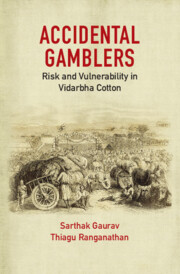3 - Field and Fieldwork
Published online by Cambridge University Press: 18 April 2023
Summary
The two preceding chapters provided an expansive historical background of Vidarbha and elucidated the transformation of its cotton economy. The colonial takeover resulted in the dismantling of traditional institutions such as balutedari and introduction of the khatedari system that bestowed property rights on the farmers who became central to the revenue of the state. With expansion of railways, there was growth of ‘cotton towns’ along the railroads such as Khamgaon and Murtizapur (in present-day Akola) as well as market towns such as Amravati and Akola. The local economy was stimulated by the American Civil War but with later changes such as crackdown on usury; and introduction of courts, Vidarbha became increasingly integrated with global markets in a manner that increased dependence of the farmers and agricultural labourers on cash and credit. Consequently, the colonial state's attempts to settle cultivators for cotton expansion irrevocably altered the rhythms of Vidarbha society.
Communities such as the Banjaras, who were pivotal in the movement of raw cotton and food grains on carts and pack bullocks, lost out with the expansion of railways and decline of the cattle economy in the second half of the nineteenth century. They were also coerced into settling down for cotton cultivation by the colonial state that was suspicious of their mobility. Mobility restrictions for Banjara communities based on ‘pass system’ became increasingly punitive, thereby adversely impacting the culture of fairs and bazaars in the region that had been facilitated by logistics services offered by the Banjaras. We also briefly described the developments since India's independence in the context of the plight and predicament of cotton farmers of the region that has been the epicentre of farmers’ suicides in the past twenty-five years.
As seen in Chapter 2, in the late nineteenth century, the region was ravaged by famines, crushing revenue demands, widespread undernourishment, disease, and mortality, but farmers’ suicides were unheard of. Indeed, the American Civil War–induced boom in the cotton economy made fortunes for many in Vidarbha as well as Bombay, but it also marred fortunes owing to crashes and panics. Moreover, far from having similar impacts on different communities in Vidarbha society, the cotton boom generated unprecedented wealth for merchants, traders, moneylenders, and large khatedars in particular. Kunbi peasants and agricultural labourers, on the other hand, were even more vulnerable to food inflation and adverse income shocks as traditional forms of social insurance weakened.
- Type
- Chapter
- Information
- Accidental GamblersRisk and Vulnerability in Vidarbha Cotton, pp. 161 - 217Publisher: Cambridge University PressPrint publication year: 2023

